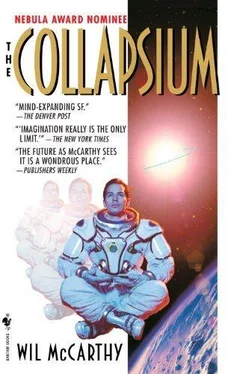The overall effect was completely startling: an immaculate palace or temple complex as glimpsed at the moment of sunrise, but folded in on itself until inner and outer walls met, creating the dreamlike sensation that one was neither inside nor outside, neither above and looking down, nor below and looking up. No matter where one stood or where one looked, one was, it seemed, perpetually about to enter some grand, vaulted inner space that in fact couldn’t possibly exist.
All this said something important, Bruno felt, about the psychological workings of a certain Declarant-Philander, though exactly what it said he wasn’t sure. There was a kind of ostentation here: modest wealth conspicuously displayed. Well, modest by Bruno’s standards, at any rate; probably very few people could afford to live this way, and fewer still would do it if they could.
“Many people,” Bruno had observed shortly after entering this place, “are too timid or oblivious to shape an environment to their own true hearts. You, Marlon Sykes, are not one of them.”
Marlon, reclined on a couch and plucking at the strings of a mandolin, had laughed pleasantly, clearly taking the comment as Bruno had intended it.
“You flatter me,” he’d said, and his robots had handed Bruno a mug of chilled green tea. This other Marlon, relaxing at home, seemed far more at ease than his counterpart at the grapple station, far happier to greet the man he regarded as a rival, on the arm of the woman he’d once loved.
We all have multiple faces and aspects , Bruno mused, but rarely is the contrast so obvious . That was life in the Queendom for you; the Iscog joined every fax machine to every other, reducing all of space, topologically speaking, to a single geometric point. This permitted—in fact demanded—the encountering of innumerable rareties and ironies and stark, polar opposites, all superimposed atop one another. Impossible, of course, without the transfinite self-recursions of collapsium-based computing devices.
He supposed he could permit himself, at such a moment, to admire his handiwork.
Now the three of them lounged on soft couches in the slanting light beside a softly chattering cascade, clear water spilling down stairs of white marble in the shade of a line of olive trees. Tamra’s slender silver robots stood guard on either side, like statues.
“How they got there isn’t clear,” Marlon was saying. He’d put away his mandolin and was tracing with his index finger on a wellstone slate. “But this whole segment of the ring is contaminated with muons, in tight little orbits around the collapson nodes.”
On Bruno’s own slate, Marlon’s tracings were echoed, and quickly became solid, detailed, three-dimensional-looking images. The sun blazed, and the Ring Collapsiter—its thickness exaggerated by several orders of magnitude—glittered around it like a two-thirds completed crown. Fully half the structure, though, showed not the soothing blue of Hawking-Cerenkov radiation, but a kind of dingy brown glow. Presumably, this was as fictitious as the ring’s thickness; Bruno couldn’t think of any collapsium process that would create a visible signature like that one.
Bruno sipped from his mug, nodding. The tea was a little sweet for his taste, but he wasn’t sure it would be polite to ask the mug to change it for him. Not right in front of Marlon; not when he was being so friendly.
“I see. And the ring is slipping because the EM grapples would damage the contaminated region? By pulling its lattices out of phase?”
“Just so. We dare not disturb it further.”
“You’re distributing the load across the remainder of the ring, yes? What there is of it, I mean. Your stations remain operational, just aimed differently, at the undamaged arc segments?” He studied the drawing. “Yes, that would produce a side force, wouldn’t it? But you can’t turn the grapples off, either, cutting the puppet’s strings, as it were. The whole thing would fall into the sun in a matter of days!—And you can’t attach a wellstone sail to the contaminated area, because the orbiting particles would smash through it precisely where the stress is greatest.”
“We tried it,” Marlon said, shaking his head ruefully. “The sails collapsed immediately and fell into the black holes. Theoretically the holes are semisafe, too small to swallow even a proton, but if you jam one in there hard enough, it’ll go. And that’s the beginning of the end, because it increases the size of the hole, making it ever so slightly easier for the next particle to penetrate. And of course, any mass change disrupts the equilibrium of the crystal lattice, so already, the collapsium is inherently unstable.”
“Ah,” Bruno said, beginning at last to understand. “That’s why you want higher frequencies on the grapples: so you can grab hold right where you need to. The collapsium is in a precarious state, and gravitic disturbances are to be avoided at all costs. But frequencies higher than those of gravitation won’t set up the same sort of destructive resonance.”
Marlon’s smile was only a little tight. “Your edge remains keen, Declarant. In minutes, you reiterate the analysis of weeks. Yes, it’s exactly as you say.”
“The work progresses poorly, though,” Her Majesty interjected, in cool tones. “The collapsiter builds momentum with each passing moment. Even if Declarant Sykes’ plan works perfectly, there may not be time to stop its fall. And if we’re lucky enough to stop it just above the sun’s surface, rather than below, I still think the result is unlikely to please us. Your services, Bruno, are very much in need.”
Bruno sighed, as uncomfortable as ever with this notion that the unsolvable problems were somehow his to solve. “My ‘services’ seem to have come up with precisely the same solution that Marlon’s did. It’s the right solution, Tarn.”
Her Majesty said nothing, but put on a faux vapid smile that meant she found his comment foolish.
Grumbling, Marlon threw his tea mug into the little cascade, where it clanked and splashed and skidded to a halt, resting half submerged on the marble bottom. “We’ve enough force to lift this thing, Majesty. It’s simply a matter of applying that force where it’s needed. As I’ve told you, the math is really quite straightforward.”
“Undoubtedly,” she agreed, nodding once.
“You can be infuriating sometimes, Tarn,” Bruno said to her, not unkindly. In decades past, he’d sometimes spent whole days, even weeks being infuriated by her. Truthfully, there were worse ways to spend one’s time. But Marlon did not seem so amused.
“Just think about the problem for me,” she said, nestling back into her couch and closing her eyes, as if basking in warm sunlight, though in truth the glow of the illuminated dome was rather cool. “Both of you.”
They were all silent for a few seconds.
“I do mean now,” she noted.
Both men grumbled and, taking advantage of her closed eyes, made sarcastic faces. Then, seeing each other, they laughed, the tension going out of them. Bruno hurled his own mug into the fountain, causing a brief ripple of alarm in Tamra’s robots, and then he leaned back with his arms behind his head. Might as well assume a comfortable thinking position, yes? Leather and wood creaked pleasantly beneath him.
“Hmm, yes. A pickle indeed. So how long until we’re rid of these particles?”
Marlon sat up on an elbow. “Rid of them how? By decay?”
“Right.”
A detailed discussion ensued.?
“Eleven months,” Bruno mused, when they’d kicked it around for a while. “That’s odd. May I examine your raw data?”
Marlon’s good cheer faded a bit. “Of course, yes. What data we have is yours.”
Читать дальше












